旅游英语教程 最新完整
- 格式:ppt
- 大小:5.83 MB
- 文档页数:5
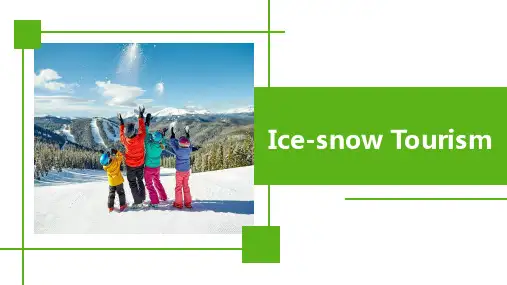
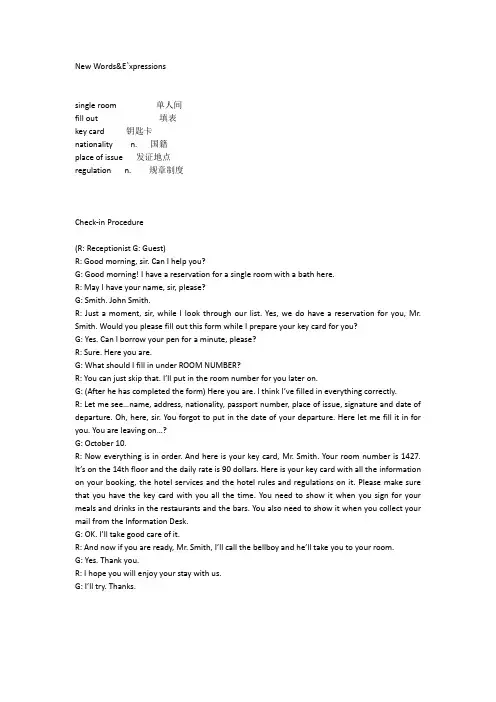
New Words&E`xpressionssingle room 单人间fill out 填表key card 钥匙卡nationality n. 国籍place of issue 发证地点regulation n. 规章制度Check-in Procedure(R: Receptionist G: Guest)R: Good morning, sir. Can I help you?G: Good morning! I have a reservation for a single room with a bath here.R: May I have your name, sir, please?G: Smith. John Smith.R: Just a moment, sir, while I look through our list. Yes, we do have a reservation for you, Mr. Smith. Would you please fill out this form while I prepare your key card for you?G: Yes. Can I borrow your pen for a minute, please?R: Sure. Here you are.G: What should I fill in under ROOM NUMBER?R: You can just skip that. I’ll put in the room number for you later on.G: (After he has completed the form) Here you are. I think I’ve filled in everything correctly.R: Let me see…name, address, nationality, passport number, place of issue, signature and date of departure. Oh, here, sir. You forgot to put in the date of your departure. Here let me fill it in for you. You are leaving on…?G: October 10.R: Now everything is in order. And here is your key card, Mr. Smith. Your room number is 1427. It’s on the 14th floor and the daily rate is 90 dollars. Here is your key card with all th e information on your booking, the hotel services and the hotel rules and regulations on it. Please make sure that you have the key card with you all the time. You need to show it when you sign for your meals and drinks in the restaurants and the bars. You also need to show it when you collect your mail from the Information Desk.G: OK. I’ll take good care of it.R: And now if you are ready, Mr. Smith, I’ll call the bellboy and he’ll take you to your room.G: Yes. Thank you.R: I hope you will enjoy your stay with us.G: I’ll try. Thanks.。

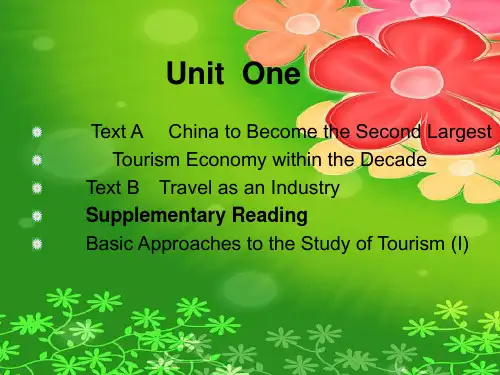
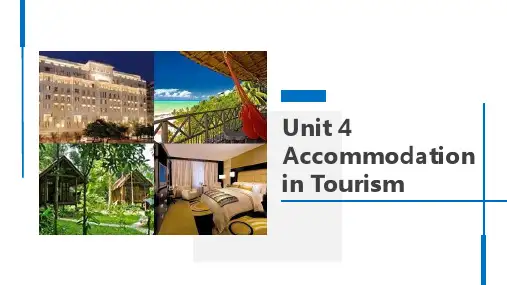
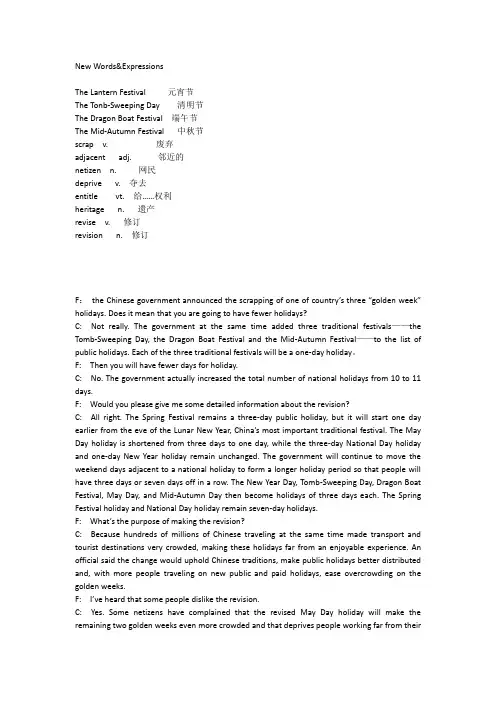
New Words&ExpressionsThe Lantern Festival 元宵节The Tonb-Sweeping Day 清明节The Dragon Boat Festival 端午节The Mid-Autumn Festival 中秋节scrap v. 废弃adjacent adj. 邻近的netizen n. 网民deprive v. 夺去entitle vt. 给……权利heritage n. 遗产revise v. 修订revision n. 修订F:the Chinese government announced the scrapping of one of country’s three “gol d en week” holidays. Does it mean that you are going to have fewer holidays?C: Not really. The government at the same time added three traditional festivals——the Tomb-Sweeping Day, the Dragon Boat Festival and the Mid-Autumn Festival——to the list of public holidays. Each of the three traditional festivals will be a one-day holiday。
F: Then you will have fewer days for holiday.C: No. The government actually increased the total number of national holidays from 10 to 11 days.F: Would you please give me some detailed information about the revision?C: All right. The Spring Festival remains a three-day public holiday, but it will start one day earlier from the eve of the Lunar New Year, China’s most important traditional festival. The May Day holiday is shortened from three days to one day, while the three-day National Day holiday and one-day New Year holiday remain unchanged. The government will continue to move the weekend days adjacent to a national holiday to form a longer holiday period so that people will have three days or seven days off in a row. The New Year Day, Tomb-Sweeping Day, Dragon Boat Festival, May Day, and Mid-Autumn Day then become holidays of three days each. The Spring Festival holiday and National Day holiday remain seven-day holidays.F: What’s the purpose of making the revision?C: Because hundreds of millions of Chinese traveling at the same time made transport and tourist destinations very crowded, making these holidays far from an enjoyable experience. An official said the change would uphold Chinese traditions, make public holidays better distributed and, with more people traveling on new public and paid holidays, ease overcrowding on the golden weeks.F: I’ve heard that some people dislike the revision.C: Yes. Some netizens have complained that the revised May Day holiday will make the remaining two golden weeks even more crowded and that deprives people working far from theirhometowns of the chance to go back home for family gatherings. They have even voiced their worry that a lot of company employees will not be off on the newly-added traditional festival holidays.F: Does the government know that?C: Yes. The spokesman said the revision could not satisfy all the people, whose interests might vary, but did respect the opinion of a majority. He said that 75 percent of the people were in favor of the change and that 60 percent of the netizens agreed to the way the May Day holiday was revised.F: I had paid holidays when I worked in my country. Do people have paid holidays in China? C: Yes. All employees of government agencies, enterprise and public-service institutions are entitled to take paid holidays after serving the same employer for one year. Employees who have worked for ten to 19 years will have ten days and those who have worked for 20 years and above would have 15 days.F: That’s wonderful.。
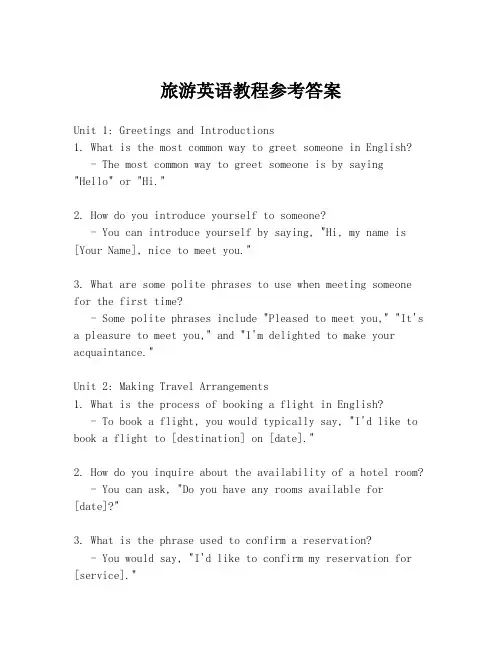
旅游英语教程参考答案Unit 1: Greetings and Introductions1. What is the most common way to greet someone in English? - The most common way to greet someone is by saying "Hello" or "Hi."2. How do you introduce yourself to someone?- You can introduce yourself by saying, "Hi, my name is [Your Name], nice to meet you."3. What are some polite phrases to use when meeting someone for the first time?- Some polite phrases include "Pleased to meet you," "It's a pleasure to meet you," and "I'm delighted to make your acquaintance."Unit 2: Making Travel Arrangements1. What is the process of booking a flight in English?- To book a flight, you would typically say, "I'd like to book a flight to [destination] on [date]."2. How do you inquire about the availability of a hotel room? - You can ask, "Do you have any rooms available for [date]?"3. What is the phrase used to confirm a reservation?- You would say, "I'd like to confirm my reservation for [service]."Unit 3: At the Airport1. What do you say when you need to check in for a flight?- You would say, "I'd like to check in for my flight to [destination]."2. How do you ask for directions to the gate?- You can ask, "Excuse me, could you please direct me to gate [number]?"3. What is the phrase used to request assistance with luggage? - You can say, "Could you help me with my luggage, please?"Unit 4: On the Plane1. How do you ask for a blanket or pillow?- You would ask, "Excuse me, could I get a blanket and a pillow, please?"2. What do you say if you need to use the restroom?- You can say, "Excuse me, where is the restroom, please?"3. How do you request a beverage or snack?- You would say, "Could I have a [beverage or snack], please?"Unit 5: At the Hotel1. What is the phrase used to check into a hotel?- You would say, "I have a reservation for [your name],I'd like to check in."2. How do you ask about the hotel's amenities?- You can ask, "What amenities does the hotel offer?"3. What do you say if you need to request extra towels?- You would say, "Could I get some extra towels, please?"Unit 6: Dining Out1. How do you ask for a table at a restaurant?- You would say, "Do you have a table for [number of people]?"2. What is the phrase used to request the menu?- You can ask, "May I see the menu, please?"3. How do you order a meal in English?- You would say, "I'd like to order [dish name], please."Unit 7: Sightseeing1. How do you ask for directions to a tourist attraction?- You can ask, "Could you tell me how to get to [attraction]?"2. What is the phrase used to buy a ticket for a tour?- You would say, "I'd like to buy a ticket for the [tour name]."3. How do you inquire about the operating hours of a museum? - You can ask, "What are the opening hours of the museum?"Unit 8: Shopping1. How do you ask for the price of an item?- You would ask, "How much does this cost?"2. What is the phrase used to negotiate a price?- You can say, "Could you give me a discount?"3. How do you ask for a receipt?- You would say, "May I have a receipt, please?"Unit 9: Emergency Situations1. How do you ask for help in an emergency?- You would say, "I need help, this is an emergency!"2. What is the phrase used to call for medical assistance? - You can say, "I need a doctor, please!"3. How do you report a lost item?- You would say, "I've lost my [item], can you help me find it?"Unit 10: Cultural Etiquette1. How do you show respect for local customs?- You can say, "I am here to learn about and respect your customs."2. What is the phrase used to apologize for a cultural mistake?- You can say, "I apologize。

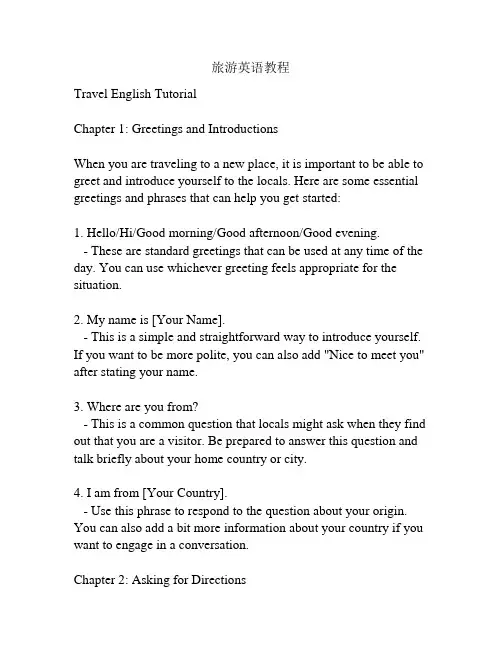
旅游英语教程Travel English TutorialChapter 1: Greetings and IntroductionsWhen you are traveling to a new place, it is important to be able to greet and introduce yourself to the locals. Here are some essential greetings and phrases that can help you get started:1. Hello/Hi/Good morning/Good afternoon/Good evening.- These are standard greetings that can be used at any time of the day. You can use whichever greeting feels appropriate for the situation.2. My name is [Your Name].- This is a simple and straightforward way to introduce yourself. If you want to be more polite, you can also add "Nice to meet you" after stating your name.3. Where are you from?- This is a common question that locals might ask when they find out that you are a visitor. Be prepared to answer this question and talk briefly about your home country or city.4. I am from [Your Country].- Use this phrase to respond to the question about your origin. You can also add a bit more information about your country if you want to engage in a conversation.Chapter 2: Asking for DirectionsWhen you are exploring a new place, you'll often find yourself in need of directions. Here are some useful phrases that can help you ask for directions:1. Excuse me, could you please tell me how to get to [Destination]? - This is a polite way to ask for directions. Make sure to use gestures or point at a map if you have one to help the person understand your question better.2. Is it far from here?- Use this phrase to inquire about the distance between your current location and your destination. The response will give you an idea of whether it is within walking distance or if you need to take transportation.3. Could you show me on the map?- If you have a map, you can ask someone to point out the directions or mark the route for you. This can be particularly helpful if you are unsure about the verbal directions given.4. Thank you so much for your help!- Always remember to express your gratitude when someone helps you with directions. It shows appreciation for their time and effort.Chapter 3: Ordering FoodTrying local cuisine is a must when traveling. Here are some phrases that can help you order food at restaurants or street stalls:1. May I see the menu, please?- This is a polite way to ask for the menu. Once you have it, take your time to look through the options before deciding what to order.2. What do you recommend?- If you are uncertain about what to order, you can ask the waitstaff for their suggestions. They can recommend popular dishes or specialties.3. I would like to order [Dish Name].- Use this phrase to place your order. Be sure to pronounce the dish correctly or point to it on the menu if you are unsure about the pronunciation.4. Could I have the bill, please?- When you finish your meal and want to pay, you can ask for the bill using this phrase. The waitstaff will bring it to you so you can settle the payment.Remember to be polite and respectful when interacting with locals, and don't be afraid to ask for help or clarification if needed. Enjoy your travel experience and have fun discovering new places!。
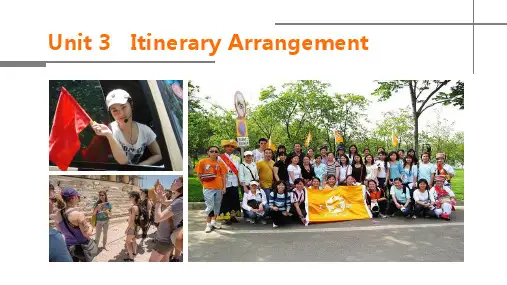

旅游英语培训教程(doc 9页)旅游英语教程 (1)第一课在机场In the Airport (1)第二课入境英语On Arrival (2)第三课电话预定房间Hotel Reservation .. 3第四课问路和交通 (4)第五课观光Sightseeing (5)第六课购物Shopping (6)第七课用餐Dining (6)第八课回国Return to China (7)passengers to board.敬请各位旅客注意,这是登机前的广播。
May I have your attention, please? This is the pre-boarding announcement.谨代表华航欢迎您搭乘202从中国北京前往美国克里夫兰的班机。
我们的飞行时间是14小时又30分。
机长Lyon与我将为您服务。
基于安全理由,起飞与降落时期禁止使用电子设备。
谢谢您的合作。
请系好安全带。
On behalf of China Airlines, we welcome you aboard flight No.202 from Beijing, China to Cleveland. Our flying time is 14 hours and 30 minutes. Captain Lyon and I will be at your service. For safety reasons, the use of personal electronic devices is prohibited during take-off and landing. Thanks for your cooperation. Please fasten your seat belt.机上服务:需要报纸吗?Would you like a newspaper?可否把椅背扶直?Could you put your seat up, please?要鸡肉还是牛肉?Would you like fish or beef?请你把袋子放在上头的柜子里。
旅游英语教程1. 引言旅游是一种广泛受欢迎的休闲和娱乐活动,而英语作为国际通用语言,在旅游过程中的交流中起着重要的作用。
本文将为您提供一份旅游英语教程,帮助您在旅行过程中顺利交流、解决问题,并享受愉快的旅行体验。
2. 基本日常用语在旅行中,了解基本的日常用语是至关重要的。
下面是一些常见的英语日常用语:•问候:–早上好/下午好/晚上好:Good morning/Good afternoon/Good evening–你好吗?:How are you?–很高兴见到你:Nice to meet you•预订酒店和机票:–我想预订一个房间:I would like to book a room.–我想预订一张机票:I would like to book a flight ticket.–我的名字是…:My name is…•询问和提供信息:–请问去…怎么走?:Excuse me, how can I get to…?–哪里可以找到好的餐厅?:Where can I find a good restaurant?–可以帮我拍照吗?:Can you take a picture for me?•紧急情况:–帮助!:Help!–我迷路了:I’m lost.–我需要医生:I need a doctor.3. 旅行交通3.1. 在机场•在机场的一些常用英语短语:–哪个是出口?:Which way is the exit?–我的行李丢失了:My luggage is lost.–我在哪里可以找到出租车?:Where can I finda taxi?3.2. 在火车站•在火车站的一些常用英语短语:–我要买一张去…的火车票:I want to buy a train ticket to…–火车几点开?:What time does the train leave?–我在哪个候车室?:Which waiting room am I in?3.3. 在公共交通中•在公共交通中的一些常用英语短语:–这辆公交去…吗?:Does this bus go to…?–下一站是…吗?:Is the next stop…?–请在站点停车:Please stop at the next station.4. 旅游景点4.1. 在博物馆•在博物馆的一些常用英语短语:–在哪个楼层可以找到…?:Which floor can I find…?–有导览地图吗?:Do you have a guide map?–可以拍照吗?:Can I take photos?4.2. 在名胜古迹•在名胜古迹的一些常用英语短语:–这是什么历史遗址?:What is this historical site?–我可以参观内部吗?:Can I visit the inside?–这里有导游讲解吗?:Are there tour guides here?4.3. 在度假胜地•在度假胜地的一些常用英语短语:–这里有海滩吗?:Is there a beach here?–我可以在哪里体验水上运动?:Where can I experience water sports?–有什么推荐的餐厅?:Are there anyrecommended restaurants?5. 紧急情况在旅行中,可能会遇到一些紧急情况。
旅游英语教程ﻩ错误!未定义书签。
第一课在机场In theAirport............................................................ 错误!未定义书签。
第二课入境英语On Arrivalﻩ错误!未定义书签。
第三课电话预定房间Hotel Reservationﻩ错误!未定义书签。
第四课问路和交通................................................................................ 错误!未定义书签。
第五课观光Sightseeing ............................................................ 错误!未定义书签。
第六课购物Shopping ............................................................................ 错误!未定义书签。
第七课用餐Dining............................................................................ 错误!未定义书签。
第八课回国Return toChina...................................................... 错误!未定义书签。
第一课在机场In the Airport需要帮忙吗?May Ihelp you?我要办理此次班机的登机手续。
I'dlike to check in for this flight, please.请把行李放在磅秤上。
Please put yourluggage onthis scale.你需要在柜台托运你的行李。
You need to claimyour baggage at the counter. 我可以把这件行李随身带到飞机上吗?Can I take this oneas carry-on baggage?班机准点吗?Is theplaneon schedule?可否给我靠窗的座位?/靠走道的座位?Could I getawindowseat?/an aisle seat?登机门是几号?Whatis the gate number?登机门怎么走?Whichway to the gate?你将在旧金山机场转机。